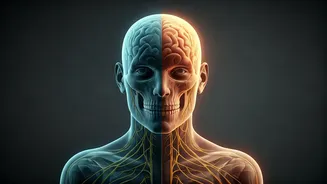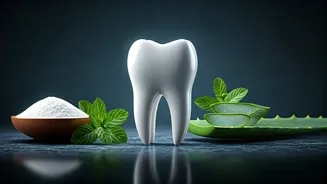Uncover the Science Behind Your Morning Coffee: 8 Fascinating Facts About Caffeine. Delve deeper into its effects and benefits
For many Indians, the day doesn't truly begin until that first, fragrant cup
of coffee is savoured. Whether it's a frothy cappuccino, a strong filter coffee, or a quick instant mix, coffee – and the caffeine within – is a daily ritual. But how much do we really know about this ubiquitous stimulant?
Beyond just waking us up, caffeine has a fascinating effect on our bodies and minds. Let's delve into the science behind your morning brew and uncover some surprising facts about caffeine.
Caffeine works its magic by blocking a neurotransmitter called adenosine in the brain.
Adenosine is responsible for slowing down nerve activity and making us feel tired, hence making us feel less drowsy. Caffeine molecules attach to the adenosine receptors, meaning adenosine can't bind, and the brain's activity increases.
This leads to that feeling of alertness, enhanced focus, and even improved mood that so many coffee drinkers crave each morning. But it's not just about feeling awake; this neurological shift also has a cascade of other effects. Furthermore, the effect of caffeine varies from person.
This variance is due to genetics and other body functions of the human.
Caffeine doesn't just impact our brain; it also influences our physical performance. It triggers the release of adrenaline, the "fight or flight" hormone, which increases heart rate and blood flow.
This surge of adrenaline prepares your body for action, improving physical endurance and reducing the perception of pain. Endurance athletes often use caffeine strategically before competitions to boost their performance.
But there's a catch – too much caffeine can lead to the jitters, anxiety, and even digestive issues. Finding the right balance is key to harnessing its performance-enhancing benefits. Remember, listen to your body and adjust your consumption accordingly.
Interestingly, caffeine doesn't get stored in the body. It's quickly processed by the liver and its metabolites are then excreted in the urine. The half-life of caffeine, which is the time it takes for half of the amount to be eliminated from your system is around five hours.
This means that if you consume 100 milligrams of caffeine at 8 AM, around 50 milligrams will still be present in your body by 1 PM. This lingering presence is why it's advisable to limit caffeine intake later in the day to avoid sleep disturbances.
Your individual metabolism, genetics, and even age can all affect it.
While coffee is the most popular source of caffeine, it's found naturally in other plants as well, including tea leaves, cocoa beans, and guarana berries.
That means you're ingesting caffeine when you drink tea, eat chocolate, or consume energy drinks containing guarana. Even some over-the-counter medications, like pain relievers, contain caffeine to enhance their effectiveness.
This is why it’s important to track your caffeine intake from all sources, not just your coffee cup. Reading labels carefully will help you avoid exceeding your tolerance level and experiencing unwanted side effects. Understanding all the sources is key to managing your health.
Caffeine is indeed a mild diuretic, meaning it can increase urine production. But the claim that coffee drastically dehydrates you is a misconception.
Studies show that moderate coffee consumption doesn't lead to significant fluid loss, especially among regular coffee drinkers who have developed some level of tolerance. The fluid intake from the coffee itself largely offsets the diuretic effect.
However, if you're not a regular coffee drinker or you're engaging in strenuous activity, it's still important to stay properly hydrated with water alongside your coffee. Listen to your body's signals of thirst and replenish fluids accordingly, particularly during hot weather.
Many people develop a tolerance to caffeine over time, meaning they need to consume more of it to achieve the same effects. This happens because the brain adapts to the regular presence of caffeine and produces more adenosine receptors to compensate.
This can lead to a cycle of increasing caffeine consumption to chase that initial buzz. Abruptly stopping caffeine intake can lead to withdrawal symptoms like headaches, fatigue, and irritability. Gradually reducing your consumption is a more comfortable approach to breaking the cycle.
Giving your body a break from caffeine can also help reset your sensitivity and regain its initial effectiveness.
Eight interesting caffeine facts to gain insights on caffeine :
Overdose is possible
While rare, caffeine overdose is possible, especially with highly concentrated caffeine sources like powders or energy shots. Symptoms can include rapid heartbeat, vomiting, seizures, and even death.
Adhere to recommended daily limits (around 400mg for most adults) and avoid combining caffeine with alcohol or other stimulants.
Genetic Variability
Genes play a big role in how our bodies process caffeine. Some people break it down quickly and feel the effects for a shorter time, while others metabolize it slowly, making them more sensitive to its effects and more prone to side effects like anxiety or insomnia.

Caffeine and Anxiety
While caffeine can boost alertness and focus, it can also exacerbate anxiety symptoms in some individuals. If you're prone to anxiety or panic attacks, it's important to monitor your caffeine intake and reduce it if necessary.

Beyond Coffee
Caffeine is added to a variety of products, from soft drinks and energy bars to gum and even some cosmetics. Always check labels to be aware of hidden caffeine sources.
It's a Natural Pesticide
Caffeine is a natural pesticide produced by plants to deter insects. That's why coffee plants are relatively pest-resistant!

Caffeine and Gut Health
Caffeine can stimulate bowel movements, which is why many people feel the urge to go to the bathroom after drinking coffee. However, it can also irritate the digestive system in some individuals, leading to heartburn or stomach upset.
Caffeine Can Affect Sleep
Even if you don't feel wired after drinking caffeine, it can still disrupt your sleep quality. Avoid caffeine consumption at least six hours before bedtime to ensure a restful night.

It Impacts Women More
Women are more sensitive to caffeine especially during their period or menstruation cycles.
Understand caffeine's effects for informed consumption
So, next time you reach for that cup of coffee, remember the complex science at play. By understanding how caffeine affects your body, you can make informed choices about your consumption and enjoy its benefits while minimizing potential drawbacks.














